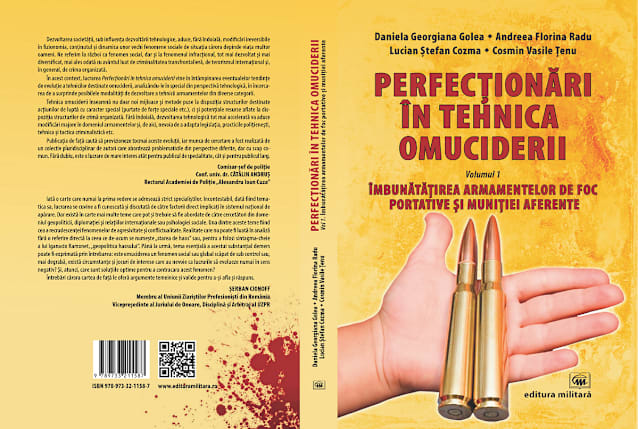Perfectionari in Tehnica Omuciderii
About
Refinements in the Technique of Killing – Volume I: Improvements to Portable Firearms and Their Ammunition is a multidisciplinary research work that investigates the technological evolution of small arms and their ammunition within the broader context of modern conflict, security, and public safety. Drawing upon expertise from military engineering, intelligence, law enforcement, and legal studies, the volume addresses both historical developments and future projections in weapon design.
Through detailed analysis, the authors explore innovations such as auto-stabilized and self-propelled projectiles, modular and interchangeable weapon platforms, and unconventional technologies including hybrid, silent, and thermobaric weapons. The study situates these advancements within the framework of the Revolution in Military Affairs (RMA), evaluating their potential impact on state authority, organized crime, and asymmetric warfare. It also raises critical questions regarding regulatory gaps and ethical challenges posed by increasingly accessible and untraceable weapon technologies.
This volume serves as both a technical reference and a strategic foresight document, intended for military researchers, defense industry professionals, intelligence analysts, and policymakers concerned with the implications of technological innovation in the domain of armed violence.
Praise for this book
In this context, the volume Refinements in the Technique of Killing addresses anticipated trends in weapons development by analyzing technological evolution and the implications of such changes from a multidisciplinary perspective. The authors seek to identify and interpret future patterns in the design, function, and tactical use of modern weapon systems.
The study provides a comprehensive approach to the modernization of portable firearms and ammunition, integrating viewpoints from engineering, military science, intelligence, criminal justice, and law enforcement.
Through this analytical lens, the authors anticipate key transformations in the ways weapons are conceptualized, regulated, and used—raising essential questions about their impact on security policy, criminal behavior, and public order.
This work is the result of rigorous research conducted by a multidisciplinary team of experts and is intended not only for specialists, but also for a wider audience interested in the future of security and armed conflict.
At first glance, this book may seem intended exclusively for technical experts. Undeniably, its central theme involves discussions on national defense systems and public safety. But beyond that, this work opens up a much broader debate—one that delves into the mechanisms of societal control, geopolitical balance, and international regulatory frameworks.
In a world facing rapid technological acceleration and increasingly complex threats, this book boldly explores fundamental questions:
“What if the future leads us back to the past?”
“What happens when humanity reaches a tipping point—the threshold of chaos?”
The idea of a society where violence becomes structurally normalized, and where social control slips beyond the reach of institutional authority, is no longer merely speculative. This book urges us to consider the real risk of descending into a new form of global disorder, where innovation in weaponry outpaces the legal and moral frameworks meant to contain it.
Through sharp questions and courageous foresight, the authors offer not only a warning—but also a response.
